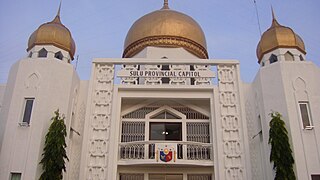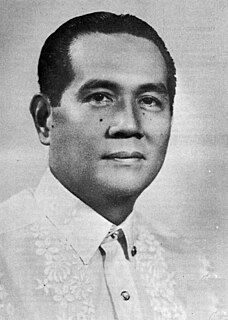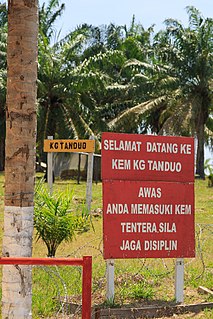Related Research Articles

Sulu is a province of the Philippines in the Sulu Archipelago and part of the Bangsamoro Autonomous Region in Muslim Mindanao (BARMM).

The Autonomous Region in Muslim Mindanao was an autonomous region of the Philippines, located in the Mindanao island group of the Philippines, that consisted of five predominantly Muslim provinces: Basilan, Lanao del Sur, Maguindanao, Sulu, and Tawi-Tawi. It was the only region that had its own government. The region's de facto seat of government was Cotabato City, although this self-governing city was outside its jurisdiction.
The Malay language has a complex system of styles, titles and honorifics, which are used extensively in Brunei, Malaysia, and the southern Philippines.

Diosdado Pangan Macapagal Sr. was the ninth President of the Philippines, serving from 1961 to 1965, and the sixth Vice-President, serving from 1957 to 1961. He also served as a member of the House of Representatives, and headed the Constitutional Convention of 1970. He was the father of Gloria Macapagal Arroyo, who followed his path as President of the Philippines from 2001 to 2010.

The Sultanate of Sulu was a Muslim state that ruled the islands in the Sulu Archipelago, parts of Mindanao in today's Philippines, certain portions of Palawan and north-eastern Borneo.

The Tausūg or Suluk, are an ethnic group of the Philippines and Malaysia, small population can also be found in the northern part of North Kalimantan, Indonesia. The Tausūg are part of the wider political identity of Muslims of Mindanao, Sulu and Palawan. Most of the Tausugs have converted into the religion of Islam whose members are now more known as the Moro group, who constitute the third largest ethnic group of Mindanao, Sulu and Palawan. The Tausugs originally had an independent state known as the Sultanate of Sulu, which once exercised sovereignty over the present day provinces of Basilan, Palawan, Sulu, Tawi-Tawi, Zamboanga City, North Kalimantan and the eastern part of the Malaysian state of Sabah.

The North Borneo dispute, also known as the Sabah dispute, is the territorial dispute between Malaysia and the Philippines over much of the eastern part of the state of Sabah. Sabah was previously known as North Borneo prior to the formation of the Malaysian federation.
Jamalul ibni Punjungan Kiram III was a former self-proclaimed Sultan of the Sulu Sultanate who claimed to be "the poorest sultan in the world". He was known as an unsuccessful candidate for senator in the Philippine general elections in 2007. In 2013, Kiram III sparked a controversy when he revived a dispute between the Philippines and Malaysia by leading an intrusion into the eastern part of Sabah. His daughter is Princess Jacel Kiram, a proponent of the Sabah claim of the Philippines in 2016.
The Malaysia–Philippines border is a maritime boundary located in the South China, Sulu and Celebes Seas. It separates the Malaysian state of Sabah, which is on the island of Borneo, and the Sulu Islands of the southern Philippines.

Muedzul Lail Tan Kiram is the head of the Royal House of Sulu, a position which he has held since 16 February 1986. As the eldest son of the former Sultan Mohammad Mahakuttah Abdulla Kiram, he is the legitimate heir claimant to the throne of the Sultanate of Sulu. He is a pretender to the throne as the 35th Sultan of Sulu.
The Royal House of Sulu is an Islamic royal house which ruled the Sulu Sultanate. In 1962, the Philippine Government under the leadership of President Diosdado Macapagal officially recognized the continued existence of the Royal Sultanate of Sulu.
Ismael ibni Punjungan Kiram II was a self-proclaimed Sultan of the Sultanate of Sulu from 12 March 2001 until his death on 19 September 2015.

The 2013 Lahad Datu standoff, also known as the Lahad Datu incursion or Operation Daulat, was a military conflict that started on 11 February 2013 and fully ended on 24 March 2013. The conflict began when 235 militants, some of whom were armed, arrived by boats in Lahad Datu District, Sabah, Malaysia from Simunul island, Tawi-Tawi, in southern Philippines. The group, calling themselves the "Royal Security Forces of the Sultanate of Sulu and North Borneo", was sent by Jamalul Kiram III, one of the claimants to the throne of the Sultanate of Sulu.

The Bangsamoro are a majority-Muslim ethnic group occupying a range of territories across the southern portions of the Republic of the Philippines. On three occasions, a short-lived and unrecognized Bangsamoro state independent of the Philippines has been formally declared by the Moro National Liberation Front (MNLF). The first declaration was issued in 1974, amid the Moro conflict. Bangsamoro Land would be declared in 2012. In 2013, the United Federated States of Bangsamoro Republik was declared.

The Ligitan and Sipadan dispute [2002] ICJ 3 was a territorial dispute between Indonesia and Malaysia over two islands in the Celebes Sea, namely Ligitan and Sipadan. The dispute began in 1969 and was largely resolved by the International Court of Justice (ICJ) in 2002, which opined that both of the islands belonged to Malaysia.

Sultan Mohammad Mahakuttah Abdulla Kiram was the 34th Sultan of Sulu (1974–1986). He was the eldest son of Sultan Mohammed Esmail Kiram I and the heir apparent to the throne. He was the last Sultan of Sulu officially recognised by the Philippine government.
Sultan Muwalill Wasit II was the Sultan of Sulu. He was murdered November 21, 1936.
The Kiram–Bates Treaty, also known as the Bates Treaty, was a treaty signed by the United States and the Sultanate of Sulu during the Philippine–American War. The treaty functioned to prevent the entry of the Sulu Sultanate into the Philippine–American War while the United States concentrated its forces in northern Luzon.
References
- ↑ Omar, Ibrahim S. (July 10, 2018). Diary of a Colonized Native:(Years of Hidden Colonial Slavery). Singapore: Partridge Publishing. ISBN 9781543743272.
- 1 2 "Line of Succession of the Sultans of Sulu of the Modern Era". Official Gazette. Government of the Philippines. Retrieved August 7, 2019.
- ↑ "New Sultan of Sulu Named". The New York Times. 1950-11-20. ISSN 0362-4331 . Retrieved 2019-08-10.
- ↑ "Cession and transfer of the territory of North Borneo by His Highness, Sultan Mohammad Esmail Kiram, Sultan of Sulu, acting with the consent and aprroval of the Ruma Bechara, in council assembled, to the Republic of the Philippines | GOVPH". Official Gazette of the Republic of the Philippines. Retrieved 2019-08-10.
- ↑ "Acceptance by the Republic of the Philippines of the cession and transfer of the terriroty of North Borneo by His Highness, Sultan Mohammad Esmail Kiram, Sultan of Sulu, acting with the consent and approval of the Ruma Bechara, in council assembled, to the Republic of the Philippines | GOVPH". Official Gazette of the Republic of the Philippines. Retrieved 2019-08-10.
- ↑ "Duterte unlikely to discuss Sabah with Malaysian PM in meeting". GMA News Online. Retrieved 2019-08-10.
- ↑ "Official Week in Review: July 11 – July 17, 1969 | GOVPH". Official Gazette of the Republic of the Philippines. Retrieved 2019-08-10.
- ↑ "A Proclamation | GOVPH". Official Gazette of the Republic of the Philippines. Retrieved 2019-08-10.

